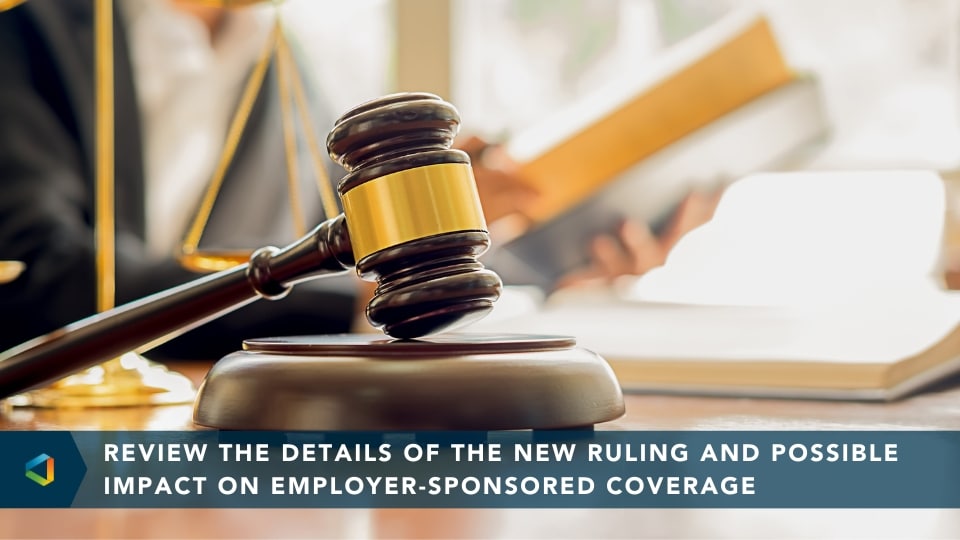Compliance Confidence
Supreme Court of the United States (SCOTUS) Rules in Favor of Employer Rights in Contraceptive Challenge
Supreme Court of the United States (SCOTUS) Rules in Favor of Employer Rights in Contraceptive Challenge
In a 7-2 SCOTUS decision, the Court rules that the Trump Administration does, in fact, have the authority to expand the ACA’s rules on the mandatory provision of contraceptives.
The Trump Administration’s expansion allows private employers to opt-out of the requirement to cover contraceptives in their health insurance plan if they have moral or religious objections.
Background
In 2010, the Affordable Care Act (ACA) brought sweeping changes to health insurance plans. Among them was the requirement for plans, including employer-sponsored health plans, to pay preventive care at 100%. Although the ACA does not specifically address contraceptives, the Obama administration, as part of its 2012 rulemaking and regulatory action, provided express authority to the Health Resources & Services Administration (HRSA) to define preventive care. Subsequently, contraceptive coverage was specifically itemized by the HRSA as part of the ACA’s list of required preventive care services.
As part of the expansion, the Obama Administration’s expansion did not apply to churches and other houses of worship. It also allowed religious non-profit groups with an alternative to opt-out of the coverage. This opt-out still provided employees with the contraceptive coverage through the insurance carrier directly. These employers contend that this accommodation provides the coverage indirectly through the employer, which still violates their religiously held beliefs.
In 2014, Hobby Lobby sued the administration claiming closely-held for-profit organizations could be exempt from the coverage mandate and the SCOTUS agreed. Since then, the administration has written regulations further expanding the exemption of individuals and employers to include those who would compromise their moral beliefs by having to comply with this provision.
The list below shows the timeline of major events in this case:
August 2012 |
Contraceptives added to required preventive care services under ACA |
June 2014 |
SCOTUS rules that closely-held, for-profit corporations could be exempt [Burwell v. Hobby Lobby] |
August 2017 |
Court of Appeals affirms and clarifies that it applies only for religious conviction, not merely moral-based |
October 2017 |
Departments write interim final rules expanding the exemption to entities with sincerely held religious beliefs |
December 2017 |
District courts in CA and PA granted preliminary injunction blocking interim final rule |
November 2018 |
Department’s final rule, effective January 14, 2019 expands to entities and individuals wanting to protect their moral beliefs |
December 2018 |
Additional states join CA modifying complaint stating HHS violated the Administrative Procedures Act |
June 2019 |
Texas district court issues permanent injunction that bars government from mandate enforcement |
October 22, 2019 |
Ninth Circuit Court of Appeals affirms preliminary injunction blocking HHS’s final rule |
The Decision
The two dissenting justices, Sonia Sotomayor and Ruth Bader Ginsburg, agree that this decision makes it harder for women to obtain free birth control. However, Justice Thomas counters that since the ACA does not contain express language, including contraceptive coverage, then it was not the intention of the lawmakers drafting the law.
Further, Justice Thomas writes that the Department’s rules expanding the exemption to employers with religious and moral objections were consistent with the ACA there was no need to rule on the impact of the Religious Freedom Restoration Act (RFRA), a 1993 law that prohibits the federal government from creating laws that impede an individual’s ability to freely practice their religion. He also agreed that it is appropriate for the Departments to consider the RFRA since there is clearly a conflict here and prior SCOTUS instructions advise the Department to consider the RFRA going forward.
The other issue that Thomas addresses is the States’ argument that the exemptions were invalid due to failure to properly follow the rulemaking procedures. Here, the States indicate that the final rules were virtually the same as the interim rules giving the appearance that there was not ample consideration for comments provided through the process. Thomas affirms that under the Administrative Procedures Act (APA), there was no violation, i.e., that all procedures were followed.
Two of the Justices, Neil Gorsuch and Samuel Alito, concur but feel that the decision should have gone farther to consider the RFRA and that the Departments were required to create the corresponding religious exemption for the Little Sisters of the Poor. Justices Elena Kagan and Stephen Breyer also agreed with the decision but not the reasoning and that the lower courts will have more to address regarding reasonability of the decision-making.
In conclusion, Thomas writes: “But for the past seven years,” he wrote, “they—like many other religious objectors who have participated in the litigation and rulemakings leading up to today’s decision—have had to fight for the ability to continue in their noble work without violating their sincerely held religious beliefs. After two decisions from this Court and multiple failed regulatory attempts, the Federal Government has arrived at a solution that exempts the Little Sisters from the source of their complicity-based concerns—the administratively imposed contraceptive mandate.” Additionally, Thomas explains that the Administration “had the statutory authority to craft that exemption, as well as the contemporaneously issued moral exemption,” and the “rules promulgating these exemptions are free from procedural defects.”
Next Steps
The decision now goes back to the lower courts in New Jersey and Pennsylvania to determine whether the expansion was a product of reasonable decision-making or if it is arbitrary and capricious, which would violate the APA. For this reason, we will most likely see additional action taken up this fall. Further, the outcome of the 2020 election could have some impact on its future.
In the interim, employers now are free to exercise their ability to remove contraceptive coverage from their sponsored health plans. It is unclear how the insurance carriers will handle this, but self-funded plans may amend their health plans to remove this from their offering if they so choose. All employers wanting to exercise this exemption should work with their benefits consultant to determine the best way to proceed.




